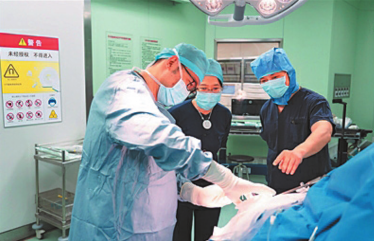Breakthrough in Shanghai lab gives voice to thought

SHANGHAI — A group of Chinese researchers and clinical neurologists has made a new breakthrough in brain-computer interface technology, enabling 10 individuals to communicate complex Chinese sentences through their thoughts alone.
The technology, currently in clinical trials, offers new hope for patients with speech loss due to conditions such as stroke.
Collaborating scientists from Shanghai-based startup INSIDE and Huashan Hospital affiliated with Fudan University implanted electrodes into participants with epilepsy.
After an average of just 100 minutes of training, their custom-built intelligent system decoded brain activities associated with the intended speech of 54 Chinese characters in real time.
Training on those characters then enabled the system to interpret 1,951 common words correctly and generate complete Chinese sentences in under half a second, with virtually no length limit.
"Unlike English's basic phonemes, Mandarin involves over 400 nuanced syllables," explains Li Meng, INSIDE's chief scientist.
The team trained on data from the world's largest human brainwave database built by Huashan Hospital, and the AI identified phonetic components with over 83 percent accuracy, according to Li.
Looking ahead, researchers envision the decoded text allowing users to control smart environments, or even generate expressive artworks through generative AI systems.
Huashan Hospital has played a key role in brain-computer interface clinical trials. In August 2024, neurosurgeons at the Hospital implanted a 256-channel flexible BCI device designed by the Shanghai-based NeuroXess into a 21-year-old female patient with epilepsy. Within the 48 hours, the patient successfully engaged in table tennis and snake computer games through brain control.
In June 2025, a Chinese man who had lost all four limbs in a high-voltage accident 13 years ago was shown playing chess and racing games using only his mind. This followed the implantation of a BCI device developed by the Chinese Academy of Sciences.
Recognizing BCI as a strategic future industry, Shanghai is building BCI incubators and fostering an innovation ecosystem. The city aims to achieve high-quality brain control and fully integrate BCI products into clinical applications by 2030.
Xinhua


Today's Top News
- Xi hears report from Macao SAR chief executive
- Xi hears report from HKSAR chief executive
- UN envoy calls on Japan to retract Taiwan comments
- Innovation to give edge in frontier sectors
- Sanctions on Japan's former senior official announced
- Xi stresses importance of raising minors' moral standards






























